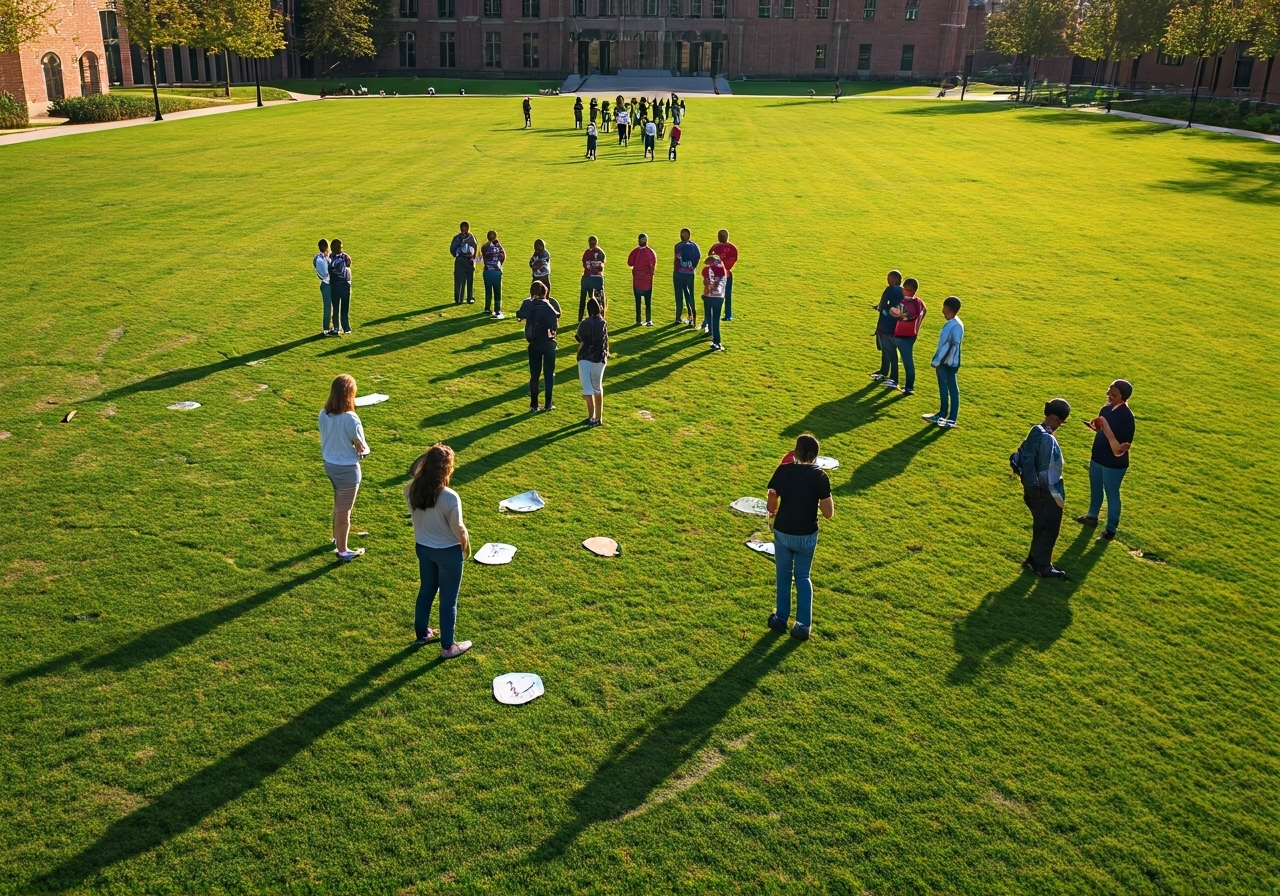
Entering college marks a significant transition in life, bringing with it opportunities for personal growth and new relationships. However, this new chapter can also foster feelings of loneliness among students, particularly as they navigate unfamiliar environments and social dynamics. The struggle to connect with peers can be daunting, particularly for those moving away from established support systems. Understanding loneliness within the context of higher education is crucial, as it can impact not just emotional well-being but also academic performance and overall mental health during these formative years. Loneliness at college may lead to increased stress, anxiety, or depression, and can decrease motivation and engagement with campus life. Warning signs to watch for include persistent sadness, withdrawal from social activities, changes in sleeping or eating habits, declining academic performance, and difficulty concentrating. Recognizing these signs early is important for seeking support and maintaining mental health.

Navigating college life often reveals unexpected feelings of loneliness for many students. The transition from a high school environment, where close friends might be easily accessible, to a college campus can amplify these feelings. Emotional support systems may fragment, leaving recent high school graduates feeling isolated amidst the bustle of university life. A recent study highlights that college students frequently experience social isolation, particularly during the freshman year. Understanding these dynamics is crucial in fostering social connections and addressing the impact of loneliness on mental health during this transformative period.
Loneliness is a prevalent issue among college students in Houston, TX, with studies indicating that nearly 60% report feeling lonely at some point during their academic journey. Factors such as urban living and diverse student populations contribute significantly to these feelings.
Various factors contribute to the feelings of loneliness experienced by students during their college years. The transition from high school to a new environment often leads to social isolation, as students navigate unfamiliar social dynamics. Additionally, the pressure of academic stress can limit opportunities for social interaction, making it challenging to form new connections. Many students also encounter feelings of homesickness, missing established relationships with family members and high school friends. Together, these elements create a perfect storm for loneliness, impacting students' overall mental health and well-being.

The transition into college life can be monumental, particularly during the freshman year. Adapting to a new environment brings a unique set of challenges, including feelings of homesickness and separation from established support systems. For many young adults, navigating new social dynamics while managing academic pressure may intensify feelings of loneliness. The unfamiliarity of college campuses often exacerbates social anxiety, making it difficult to forge meaningful connections. Recognizing these struggles is crucial for fostering resilience and ensuring a positive college experience moving forward.
Adapting to a new environment can stir deep feelings of homesickness among college students. This emotional response often arises from the transition to an unfamiliar campus, coupled with the absence of close friends and family members. Navigating a dorm room filled with memories while searching for new connections can amplify feelings of loneliness. College life is marked by social interactions that may initially feel daunting, yet these experiences serve as essential steps in establishing a new sense of belonging. Seeking social support and participating in activities can significantly alleviate homesickness, fostering emotional resilience.
Feeling disconnected from familiar relationships can be profoundly disorienting for college students, and it is completely normal to feel homesick and lonely during your first year at college. The transition from high school to a new environment often involves leaving behind close friends and family members, which may intensify feelings of loneliness. These emotions, including homesickness, can last anywhere from a few weeks to several months, but they typically lessen as students begin to build new friendships and become more comfortable in their new surroundings. Students frequently find themselves craving the emotional support and shared experiences that defined their earlier social circles. This separation can hinder the establishment of new connections in the bustling life of a college, as young adults navigate through academic pressures while longing for the comfort of familiar companionship.

Experiencing feelings of isolation can manifest in various emotional and behavioral changes. Many college students may notice increased withdrawal from social activities or a decline in academic performance. Signs like persistent sadness, reduced motivation, or excessive time spent alone in a dorm can indicate a struggle with loneliness. Recognizing these symptoms is essential for timely intervention. Understanding the difference between temporary feelings of loneliness and deeper issues like social anxiety or depression allows students to seek appropriate support, fostering healthier mental well-being during their college journey.
Emotional shifts often signal the onset of loneliness for college students. Indicators such as persistent sadness, irritability, or feelings of worthlessness can emerge, reflecting underlying mental health issues. Behaviors like withdrawing from social interactions or decreased participation in previously enjoyable activities may also surface. This disconnect can create a cycle of isolation, exacerbating feelings of loneliness. Additionally, physical symptoms such as changes in sleeping or eating patterns might manifest, serving as crucial reminders for students to recognize and address their emotional well-being before it escalates.
Navigating feelings of loneliness often involves understanding its nuances. Temporary loneliness can arise during transitional periods, such as starting college, but typically dissipates as students form new connections. In contrast, social isolation denotes a lack of social interaction, which can persist over time, deeply impacting an individual's college experience. Depression, a more severe mental health issue, manifests through prolonged feelings of hopelessness and disinterest, often requiring professional intervention. Recognizing these differences is crucial for college students, as early identification can lead to more effective coping strategies and ultimately enhance their well-being.

Experiencing feelings of loneliness can significantly affect mental health, often escalating into stress, anxiety, and depressive symptoms. For many college students, this sense of isolation may emerge during critical academic periods, leading to a decline in academic performance and overall well-being. Furthermore, chronic loneliness can have physical health consequences, influencing sleep patterns and increasing susceptibility to illnesses. Addressing these impacts through awareness and proactive support systems is crucial for fostering healthier college environments, where meaningful social connections can thrive, supporting both emotional and physical wellness.
Feelings of loneliness among college students can significantly contribute to elevated stress levels, anxiety, and depressive symptoms. As students navigate the challenges of higher education, they may find themselves isolated, struggling to form new connections. This social isolation can exacerbate pre-existing mental health issues, creating a vicious cycle that impacts academic performance and overall well-being. Understanding the intricate relationship between loneliness and mental health is critical, as it empowers students to seek help and foster healthier social interactions, ultimately enhancing their college experience.
Chronic loneliness can lead to significant physical health issues that intertwine with mental well-being. Research shows that lonely individuals may experience increased cortisol levels, contributing to heightened stress, inflammation, and even a weakened immune system. Furthermore, the lack of social interaction often correlates with sedentary lifestyles, leading to obesity and cardiovascular problems. This connection suggests that the feelings of loneliness can manifest physically, highlighting the importance of nurturing relationships to promote overall health during critical college years. Addressing loneliness is essential to breaking this detrimental cycle. If you're struggling with loneliness at college, try joining campus clubs, study groups, or volunteering in activities that match your interests to meet new people naturally. Showing openness by initiating small conversations and attending social events can help foster meaningful connections, making it easier to build friendships and support networks that positively impact both your mental and physical well-being.
Certain demographics within college campuses experience heightened feelings of loneliness due to various circumstances. International and out-of-state students often struggle with the transition, leaving behind family members and established social networks. Minority students may face cultural differences that lead to feelings of isolation. Additionally, online students contend with unique challenges arising from limited face-to-face interactions, which can impede their ability to forge meaningful connections. Understanding these risk factors can promote a greater sense of empathy and support, fostering an inclusive academic environment for all students.
Diverse experiences characterize the lives of international, out-of-state, and minority students at college. Often, feelings of isolation are intensified by cultural adjustments, challenges in establishing social connections, and a sense of being an outsider. These young adults may encounter language barriers and differing cultural norms that complicate their college experience. Additionally, the distance from family members can exacerbate feelings of loneliness. Support systems, such as peer groups and counseling services, play a critical role in helping these students navigate their unique challenges while fostering meaningful connections in their new environment. Colleges typically offer a variety of resources and support services to help students overcome loneliness, including student organizations, multicultural centers, mentorship programs, international student offices, and workshops promoting social engagement and mental well-being.
Remote education, although flexible, can often heighten feelings of loneliness among students. Lack of face-to-face interactions and the limited opportunities for social engagement may lead to social isolation. Online learners, in particular, are at greater risk of experiencing loneliness compared to their on-campus peers due to these unique barriers. Students who are introverted, new to remote learning, or balancing studies with work or family responsibilities may be more susceptible to feeling isolated. Online learners frequently struggle with building meaningful connections, making them feel disconnected from their peers and the broader college experience. Additionally, the absence of a structured environment can result in difficulties with time management and increased academic stress. It’s important for online students to seek out virtual communities and support systems to address these challenges and foster a sense of belonging.
The duration of college loneliness varies widely among students, often influenced by individual coping mechanisms and social support. Some may experience it only during initial adjustments, while others might feel isolated throughout their academic journey, usually easing as they build connections and engage with peers.
The academic year unfolds in distinct stages, each presenting unique challenges for college students. Initially, the excitement of a new environment can overshadow feelings of loneliness, but as classes intensify and routines set in, students may experience a dip in social interaction. Mid-semester often brings stress, leading to potential isolation. As spring approaches, renewed energy may inspire connections through clubs or events. Understanding these stages allows students to anticipate their emotions and seek support, fostering resilience and a more fulfilling college experience throughout the year.Several students have shared that joining campus organizations, reaching out to roommates, or attending social events helped them overcome loneliness during college. For example, one student credited regular participation in a volunteer group for providing a sense of belonging, while another found meaningful friendships through a study group formed during a stressful mid-semester period. These real stories serve as reminders that connecting with others, even in small ways, can significantly ease feelings of isolation.
Recovery speed from loneliness varies based on personal circumstances, support systems, and coping strategies. Factors such as resilience, social interactions, and mental health resources can significantly influence how quickly a student adapts to their college environment and overcomes feelings of isolation. To distinguish between normal loneliness and more severe isolation or depression, pay attention to how long negative feelings last and how much they interfere with daily functioning. Occasional loneliness is common, but persistent sadness, withdrawal from social activities, difficulty concentrating, and changes in sleep or appetite may indicate a deeper issue like depression and might require reaching out for professional support.

Building a daily routine that promotes interaction can be transformative for students facing loneliness. Engaging in regular social activities, whether through study groups or campus events, fosters connections and enhances the college experience. Practicing self-compassion and positive self-talk further empowers young adults to navigate feelings of isolation. Expressing gratitude, journaling about positive experiences, and challenging negative thoughts can significantly impact mental health. Reaching out to peers and utilizing available support services also contribute to developing a strong support system, ensuring that students feel less isolated during their academic journey.
Establishing a daily routine centered around opportunities for social interaction can significantly enhance your college experience. Start by scheduling study sessions in common areas like the dining hall or library, where you may naturally meet new people. Incorporate group activities, such as joining workout classes or attending campus events, to foster connections with fellow students. Make it a point to engage in casual conversations during classes or while in line for coffee. Regularly visiting common spaces not only alleviates feelings of loneliness but also strengthens your support system over time.
Developing self-compassion and engaging in positive self-talk can significantly alleviate feelings of loneliness among college students. By nurturing an inner dialogue that emphasizes kindness and understanding, individuals can counter negative thoughts that arise in times of isolation. This practice not only fosters emotional resilience but also encourages healthier social interactions. Recognizing achievements—no matter how small—can cultivate a more positive self-image and mitigate stress. As students embark on their college journey, these techniques can pave the way for meaningful connections and a supportive social life. Recently, the increased focus on loneliness has led college campuses to prioritize student wellbeing initiatives, such as workshops and support groups that teach self-compassion and positive self-talk techniques. These efforts aim to address emotional needs and create a more inclusive, supportive campus environment.
Building a thriving social life in college involves stepping outside your comfort zone and engaging with new people. Joining clubs and organizations tailored to your interests not only fosters connections but also ensures a sense of belonging amidst a diverse student body. Campus events, whether academic or recreational, are excellent opportunities to meet peers and cultivate meaningful relationships. In today’s digital age, social media can also play a role, linking you with like-minded individuals and enhancing your college experience while mitigating feelings of isolation.
Engaging in clubs, organizations, and campus events offers college students a unique opportunity to combat feelings of loneliness while fostering new social connections. These activities not only enhance the college experience but also provide platforms for students to meet like-minded individuals who share similar interests. Participation can reduce social isolation, improve emotional support, and build a robust support system. Whether it’s a hobby club, academic organization, or community service group, getting involved can be the first step toward developing meaningful relationships and enrich one's college journey.
Engaging with social media can serve as a double-edged sword for college students. While it offers platforms to connect with new people and foster social interactions, it can also amplify feelings of loneliness. Creating meaningful connections online requires intentionality; students should seek groups that align with their interests and values. Participating in virtual communities can facilitate emotional support and friendships. Additionally, it’s vital to balance online interactions with in-person connections to avoid the pitfalls of social isolation. This approach helps cultivate a healthier social life and enhances overall mental health.
Support services play a crucial role in alleviating feelings of loneliness among students at Texas colleges. Counseling centers are readily available, offering therapy sessions to help students navigate mental health struggles and enhance their overall well-being. Peer support groups provide a safe space for students to share experiences and foster new connections, while mentorship programs connect students with mentors who can offer valuable guidance. Engaging in community initiatives allows students to build their social network, further enriching their college experience and combating social isolation.
Counseling centers on college campuses offer vital resources for students grappling with loneliness. These centers provide professional guidance, allowing for discussions that can lead to improved mental health and emotional support. Peer support programs enable students to connect with others who share similar experiences, fostering a sense of community. Additionally, mentorship programs can significantly impact new students’ adjustment, pairing them with upperclassmen who offer insights and encouragement. Engaging in these opportunities helps build resilience, promotes social interaction, and enhances the overall college experience.
Getting involved in student-led initiatives can significantly enhance the college experience for those feeling isolated. These initiatives often provide platforms for students to engage with peers, build connections, and promote a sense of belonging. From organizing community service projects to leading cultural events, students have the opportunity to create meaningful social interactions. Engaging in these activities not only helps combat feelings of loneliness but also fosters collaboration and friendship among diverse groups, enhancing the overall campus environment. These connections contribute positively to the mental health of participants.
During their first year at university, many students faced the challenging landscape of loneliness head-on. One shared their journey of initially feeling isolated but eventually found solace in joining a campus organization, which fostered new friendships and a sense of belonging. Another student recounted how embracing vulnerability allowed them to connect with peers facing similar struggles, transforming their college experience. These narratives illuminate the resilience of young adults, emphasizing that by seeking connection and support, feelings of loneliness can be overcome, leading to a fulfilling college life.
Experiencing loneliness during college is a common narrative among students in Houston, TX. One sophomore shared, “The first semester felt overwhelming. I left behind my high school friends and struggled to find my footing.” Another student noted, “I never anticipated feeling so isolated in a bustling city. Joining a campus group helped me meet new faces and forge connections.” These real-life accounts highlight the importance of community and interaction in overcoming the challenges of loneliness and building a meaningful college experience.
Counselors and mental health advocates emphasize the importance of recognizing early signs of loneliness among college students. They encourage students to proactively seek out social interactions and to engage with campus resources, such as counseling services and support groups. Building a robust social support system can significantly alleviate feelings of isolation. Additionally, they stress that open conversations about mental health can empower students to share their experiences, fostering a sense of community. These insights highlight that tackling loneliness requires both individual efforts and collective support from peers and institutions alike.
Navigating the college years can be immensely rewarding, yet it often brings feelings of loneliness that many students experience. Building meaningful connections and fostering social interactions are vital elements to overcoming this challenge. Engaging in campus activities, reaching out to others, and utilizing mental health services can significantly improve well-being. Recognizing that loneliness is a common struggle helps students realize they are not alone in their experiences. With the right support, every student can thrive and turn lonely days into opportunities for growth and new friendships.
Several top-rated counseling centers in Houston provide cognitive behavioral therapy for anxiety and depression. Riaz Counseling is notable for its comprehensive mental health services. Other centers include The Montrose Center and The University of Houston's Counseling and Psychological Services, both offering tailored support for students.
Riaz Counseling in Texas accepts insurance from various providers, including BCBS TX, Optum, Magellan, Aetna, Cigna, and others. This accessibility helps students seeking mental health support find affordable care during their college experience. Explore available options to ease your path to wellness.
Feeling lonely during college is quite common due to major life changes and social adjustments. To cope, engage in campus activities, reach out to peers, and seek support from counseling services. Building connections can significantly enhance your college experience.
If feelings of loneliness persist and interfere with daily life, it may indicate a more serious issue. Signs include prolonged sadness, withdrawal from activities, changes in sleep or appetite, and difficulty concentrating. Seeking professional help can provide clarity and support for coping effectively.
Yes, Houston offers various student support groups and events aimed at fostering connections among students. Universities typically host meet-ups, workshops, and counseling sessions that encourage interaction and provide resources to combat loneliness, ensuring students feel supported in their college experiences.
If you feel that you or someone you know, may benefit from therapy, please reach out to our office for a FREE 15 minute consultation: LINK
Stay informed about the latest research in psychology.

Explore the causes, effects, and proven strategies to overcome loneliness in medical school, fostering resilience and better mental health.
.png)
Discover how mental health counseling can help you overcome challenges, improve emotional well-being, and build a healthier, more fulfilling life.
.png)
Discover practical habits, signs, and strategies to boost emotional health, build resilience, and enhance overall well-being for a balanced, fulfilling life.